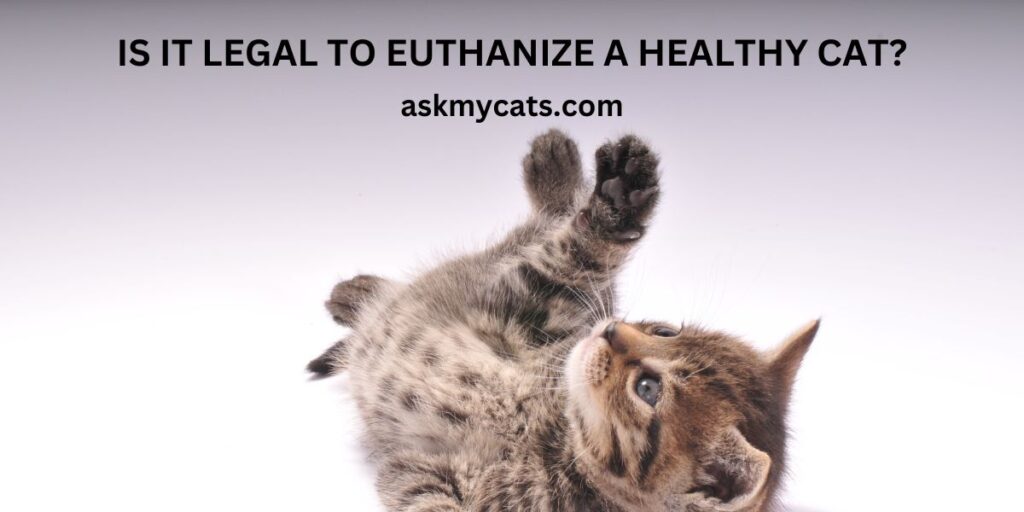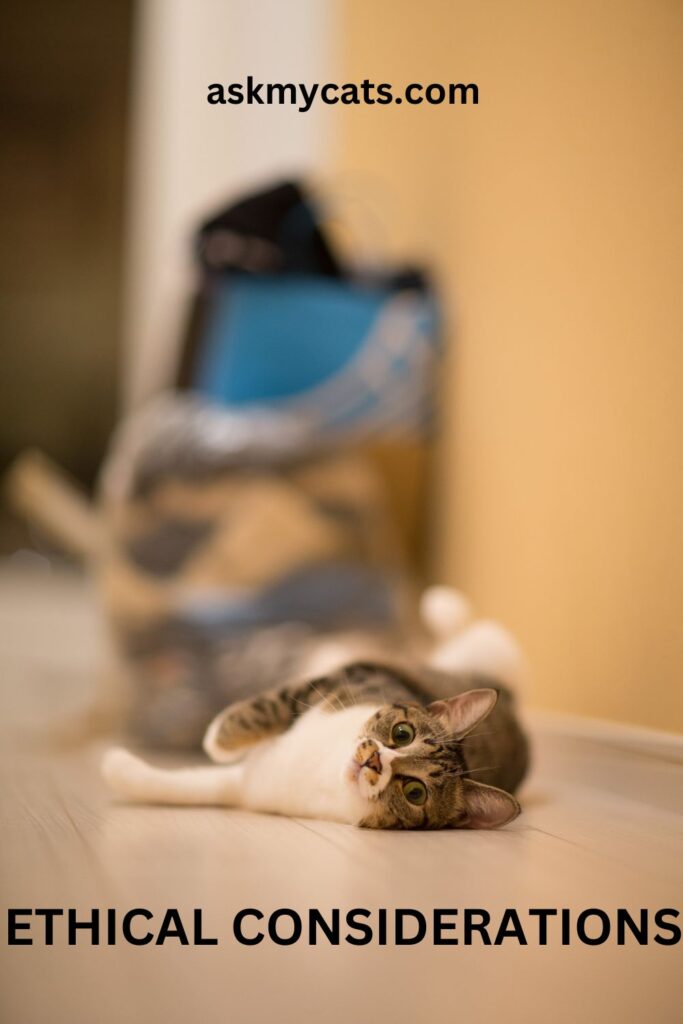Euthanasia, also known as humane animal death, is a controversial topic, especially when it comes to pets. There has been an ongoing debate about whether it is ethical or legal to euthanize a healthy cat.
Some people believe that it is a humane and necessary option when the cat is suffering, while others believe it is never acceptable to end the life of a healthy animal.
In this article, we will explore the legal aspect of euthanizing a healthy cat, including the laws and regulations surrounding this issue, and what it means for pet owners.
Key Takeaways
- The legality of euthanizing a healthy cat varies depending on the country or state.
- In some places, there may be laws that explicitly prohibit the euthanasia of healthy animals, while others may have laws that permit it under certain circumstances.
- Pet owners considering euthanasia should consult with a veterinarian or legal expert to determine the best course of action.
- Some states allow euthanasia for healthy pets if the pet owner has a legitimate reason for doing so, such as financial constraints or changes in living circumstances.
- Veterinarians must also be mindful of the laws and regulations that govern animal euthanasia.


Give Your Cat the Perfect Day
Get the Free Ebook!
Cat Euthanasia Laws By State
The following table gives information about the different US states wherein it is legal to euthanize a healthy cat as well as the conditions in which such an act may be allowed:
| STATE | CONDITION |
| Alabama | When a domestic cat is seen to be posing threat to humans or other domestic cats, it may be euthanized. |
| Alaska | Dept of Health may order the euthanasia of a domestic cat if it is seen to be carrying diseases transmissible to humans, even if the health of the animal itself doesn’t demand euthanasia. |
| Arizona | When a domestic cat is seen to be posing threat to humans or other domestic cats, it may be euthanized. |
| Delaware | When a domestic cat is seen to be posing threat to humans or other domestic cats, it may be euthanized. Even aggressive fosters in shelters may be euthanized. |
| Indiana | When a domestic cat is seen to be posing threat to humans or other domestic cats, it may be euthanized. |
| Pennsylvania | When a domestic cat is seen to be posing threat to humans or other domestic cats, it may be euthanized. |
| South Dakota | When a domestic cat is seen to be posing threat to humans or other domestic cats, it may be euthanized. |
| Wisconsin | When a domestic cat is seen to be posing threat to humans or other domestic cats, it may be euthanized. |
| California | When a domestic cat is found neglected, abandoned, and not properly cared for, it may be euthanized. |
| Connecticut | When a domestic cat is found neglected, abandoned, and not properly cared for, it may be euthanized. |
| District of Columbia | When a domestic cat is found neglected, abandoned, and not properly cared for, it may be euthanized. |
| Mississippi | When a domestic cat is found neglected, abandoned, and not properly cared for, it may be euthanized. |
| New York | When a domestic cat is found neglected, abandoned, and not properly cared for, it may be euthanized. |
| Tennessee | When a domestic cat is found neglected, abandoned, and not properly cared for, it may be euthanized. |
| Virginia | When a domestic cat is found neglected, abandoned, and not properly cared for, it may be euthanized. |
Must Read: My Cat Is Dying And I Have No Money!
Legal Considerations

In terms of legal considerations, the legality of euthanizing a healthy cat varies depending on the country or state.
In some places, there may be laws that explicitly prohibit the euthanasia of healthy animals, while others may have laws that permit it under certain circumstances.
Additionally, there may be different regulations for veterinary clinics and animal shelters.
It is important to understand the local laws and regulations surrounding euthanasia, as breaking these laws can result in serious consequences, such as fines or imprisonment.
Pet owners considering euthanasia should consult with a veterinarian or legal expert to determine the best course of action.
It is also crucial to ensure that the euthanasia procedure is performed humanely and in accordance with animal welfare regulations.
Interesting Read: How To Do Cat Euthanasia Yourself At Home?
The Legal Status Of Euthanasia In Different Countries And States
The legal status of euthanasia for healthy cats can vary greatly depending on the country or state in which you live.
In some countries, euthanasia of healthy pets is illegal, regardless of the circumstances. In other countries, euthanasia may be performed only in cases of incurable suffering, and only by licensed veterinarians.
In the United States, the legality of euthanasia for healthy pets is determined by individual states. Some states have laws that specifically prohibit euthanasia for healthy pets, while others have laws that allow for euthanasia under certain circumstances.
For example, some states may allow euthanasia for healthy pets if the pet owner has a legitimate reason for doing so, such as financial constraints or changes in living circumstances.
It is important to note that even in states where euthanasia for healthy pets is legal, veterinarians are still subject to ethical and professional standards that dictate how they should approach the decision to euthanize.
Interesting Read: What Are The Different Methods Of Cat Euthanasia?
The Role Of Veterinarians In The Euthanasia Process And Their Ethical Obligations
From an ethical standpoint, veterinarians are bound by the American Veterinary Medical Association (AVMA) Guidelines for the Euthanasia of Animals, which state that euthanasia should only be performed when it is in the best interest of the animal and it is not possible to alleviate its suffering through other means.
This means that veterinarians should only consider euthanasia as a last resort and only when the cat is suffering from a condition that cannot be cured or treated.
Interesting Read: How Much Does It Cost To Euthanize A Cat?
In addition to ethical considerations, veterinarians must also be mindful of the laws and regulations that govern animal euthanasia.
For example, in some countries, it may be illegal to euthanize a healthy animal without a valid reason, such as suffering or a serious medical condition.
Veterinarians must be aware of these laws and regulations and ensure that they are following them when performing euthanasia.
Interesting Read: What To Do After Cat Euthanasia? A Cat Owner’s Final Guide
The Potential Legal Consequences Of Euthanizing A Healthy Cat, Including Charges Of Animal Cruelty Or Neglect
Euthanizing a healthy cat without a valid reason can have serious legal consequences, including charges of animal cruelty or neglect.
In some countries, the act of intentionally ending the life of a healthy animal may be considered a criminal offense, carrying fines or imprisonment.
Animal cruelty and neglect laws vary between countries and states, but generally, they prohibit acts of intentional harm or neglect toward animals.
In the context of euthanasia, if a pet owner or veterinarian is found to have intentionally ended the life of a healthy cat without a valid reason, they could be charged with animal cruelty or neglect.
It is important to note that even if pet owner believes that they are acting in the best interest of the animal, they may still be held responsible if their actions are found to be illegal.
Interesting Read: How To Euthanize A Cat With Over-The-Counter Drugs?
Ethical Considerations

The decision to euthanize a healthy cat raises a number of ethical considerations. Some people believe that it is never acceptable to end the life of a healthy animal, regardless of the circumstances. They argue that animals have a right to life and that euthanasia is a violation of that right.
On the other hand, some people believe that euthanasia can be a humane and necessary option when the cat is suffering from an incurable condition or has a poor quality of life.
They argue that ending the animal’s suffering is a form of compassion and that it is in the best interest of the cat.
Regardless of personal beliefs, the American Veterinary Medical Association (AVMA) Guidelines for the Euthanasia of Animals state that euthanasia should only be performed when it is in the best interest of the animal and it is not possible to alleviate its suffering through other means.
This means that euthanasia should only be considered as a last resort and only when the cat is suffering from a condition that cannot be cured or treated.
Must Read: How To Deal With Regret And Grief After Putting Cat To Sleep?
The Ethical Implications Of Euthanasia, Including The Principle Of Minimizing Suffering And The Value Of An Individual’s Life
In terms of minimizing suffering, euthanasia can be seen as a way to relieve the suffering of an animal that is in pain and cannot be cured or treated.
This perspective argues that euthanasia is an act of compassion that can spare the animal from further suffering, and is in line with the ethical principle of minimizing harm.
However, this perspective is opposed by those who believe that euthanasia goes against the principle of preserving life and is a violation of the intrinsic value of an individual’s life.
They argue that taking the life of a healthy animal is never justifiable, even if the animal is suffering, and that euthanasia should only be considered as a last resort in cases of incurable suffering.
Ultimately, the ethical implications of euthanasia depend on individual perspectives and beliefs about the value of life and the importance of minimizing suffering.
Check out the in-depth guide: When To Put Your Cat Down? The Complete Checklist
The Role Of The Veterinarian And Pet Owner In Making The Decision To Euthanize A Healthy Cat
The decision to euthanize a healthy cat is a complex and emotional one that involves both the veterinarian and the pet owner.
The veterinarian plays a critical role in the euthanasia decision-making process.
They are responsible for conducting a thorough medical examination of the cat, determining the underlying cause of the animal’s distress, and providing the pet owner with information about the animal’s condition and prognosis.
Must Read: Alternatives To Euthanasia For Terminally Ill Cats
They should also provide guidance on alternative treatments or palliative care options that may be available to manage the animal’s suffering.
In addition to the medical evaluation, the veterinarian should also take into consideration the pet owner’s values, beliefs, and personal circumstances when making the euthanasia decision.
They should provide the pet owner with information about the procedure and its consequences, and offer emotional support throughout the process.
The pet owner, in turn, has the ultimate responsibility for the well-being of their cat and must make the decision to euthanize based on their own values, beliefs, and circumstances.
They should also consider the veterinarian’s medical evaluation and recommendations, as well as the animal’s quality of life when making the decision.
Must Read: Where To Euthanize A Cat For Free Or Cheap?
The Importance Of Considering The Cat’s Quality Of Life And The Potential Emotional Impact On The Pet Owner
When making the decision to euthanize a healthy cat, it is important to consider the cat’s quality of life and the potential emotional impact on the pet owner.
The quality of life of the cat should be the primary consideration when deciding whether or not to euthanize.
Factors such as the severity and frequency of pain, the cat’s ability to engage in normal activities, and the presence of other health issues should be evaluated. If the cat’s quality of life is severely diminished, and there is no hope of improvement, euthanasia may be the most humane option.
However, it is also important to consider the emotional impact that the decision to euthanize will have on the pet owner. Losing a pet can be a traumatic experience, and the decision to euthanize can be especially difficult if the cat is healthy.
Pet owners may experience feelings of guilt, sadness, and grief, and may need support and guidance from their veterinarian to help them through the process.
Interesting Read: Did My Cat Know He Was Being Put To Sleep?
Frequently Asked Questions
Can a vet deny euthanasia?
Yes, a vet can deny euthanasia on medical, ethical, and legal grounds.
Find out more details: Should I Stay With My Cat When It Is Euthanized?
Final Words
The decision to euthanize a healthy cat involves a collaboration between the veterinarian and the pet owner. Both parties should approach the decision with sensitivity, compassion, and a deep understanding of the ethical, legal, and medical implications involved.
They should work together to ensure that the euthanasia decision is in the best interest of the animal and that the procedure is performed humanely and in accordance with animal welfare regulations.
Must Read: Did I Put My Cat To Sleep Too Soon?
Interesting Read: Choosing the Right Euthanasia Option: At-Home Vs. Vet Clinic
Interesting Read: Euthanasia For Feral Cats: Compassion or Cruelty?
You Might Also Like To Read:
- Role of Veterinary Doctor In Euthanasia
- When To Euthanize A Cat With Cancer?
- When To Euthanize A Cat With Seizures?
- When To Euthanize A Cat With IBD?
- When To Euthanize A Cat With Kidney Failure?
- When To Euthanize A Cat With Feline Leukemia?
- When To Euthanize A Cat With Heart Failure?
- When To Euthanize A Cat With FIP?
- When To Euthanize A Cat With FIV?
- When To Euthanize A Cat With Dementia?
- When To Euthanize A Cat With Arthritis?
- When To Euthanize A Cat With Hyperthyroidism?
References
- https://www.avma.org/sites/default/files/2019-12/Euthanasia-Chart.pdf
- https://www.vet.cornell.edu/departments-centers-and-institutes/cornell-feline-health-center/health-information/feline-health-topics/euthanasia-what-expect-and-what-questions-ask-first
- https://www.ctvnews.ca/canada/canada-needs-laws-to-prevent-euthanization-of-healthy-pets-says-lawyer-1.3440866
